Aspiring Writerhttps://linktr.ee/baxitm - Linktree including Bluesky, Tumblr, and AO3 Loves ProjectMoon, with my primary character obsessions at this moment being Sinclair and Ryoshu
Don't wanna be here? Send us removal request.
Text
English Limbus translation fucking shit up again because Good Lord.
courtesy of @aolingyijiang on twt



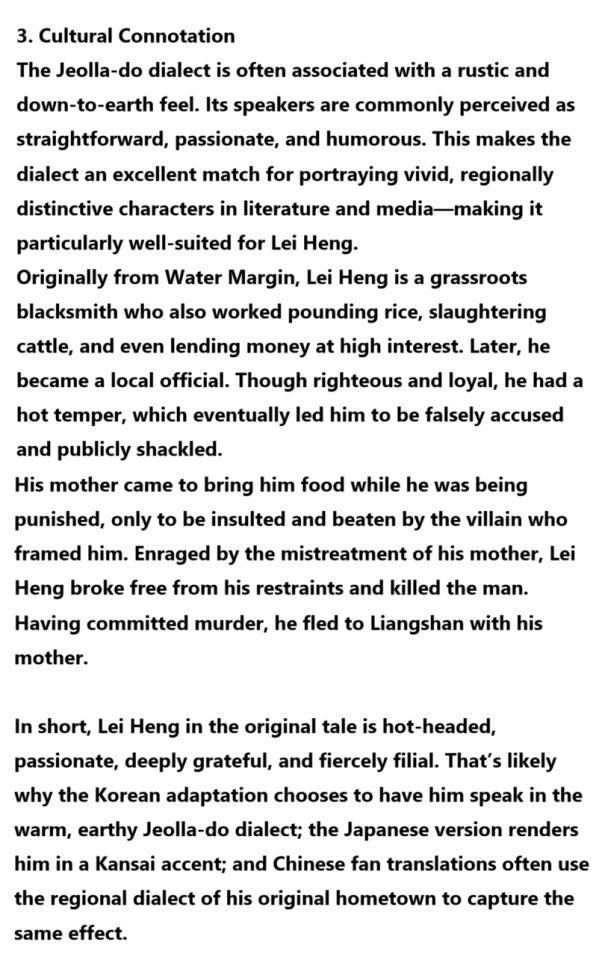


#Lei Heng lcb#Lei Heng#limbus company#So that explains a lot#Especially difference in perception#Between global#and Japan/Korean translations#Aint that a motherfucker.
239 notes
·
View notes
Text
Crazy Thoughts About Canto VIII Part 3
Did you know that in Hundred-Footed Death Maggot’s background has a sarcophagus at the center? But not any type of coffin; it’s an open one.

And it’s either filled with scrolls or bandages. I’m more partial to the second option, as the EGO animation is clearly inspired by the Jiangshi, or the Chinese “hopping vampire” (who was referenced all the way back in Canto V, as a story Hong Lu said Xiren told him once). This basically tells us that Centipede Apostle is a vampiric creature at some level… and that the same applies to the Elders or Xianren of H Corp.
Why do I say that? Well, beyond the similitude between the EGO background and the Tiekan temple (铁槛寺, or “Temple of the Iron Cage”), it’s because this last location was the family crypt or mausoleum of the Jia family in DotRC as far as I know. But then again, that’s something most people here intuit already, right? Especially with what Jia Mu said about following the “rivers’ path” despite the supposed obsession of the Elders of Hongyuan with immortality.
Anyway, the correlation between the Jiangshi and the Elders is interesting due to how contradictory it is: the Elders are Xianren, or the famous Immortals, ascetic sages or mystics that were able to attain immortality. Many things are said about them that I won’t touch here, but the important thing is that, like every good ascetic, connections with the natural world are present.

And Hong Lu said that the path towards the Elders looks even more “outside-ish” than the outside itself. Besides, the house above looks pretty metallic, with the mountains there referencing their classical depictions in East Asia to boot.
Anyway, as I said, Xian are supposed to be immortals, but true immortals. They do not age nor get sick. So, why are the Elders obsessed with the “immortality of the mind”? There are several options, but thanks to the above explanation, I’m partial to the idea they genuinely died and got resurrected, their bodies rotten and unable to leave the Tiekan temple, either because whatever “magic” they used ties them to it or because the Head will fuck them up if they go out.

(Look at those claws!)
Now, the connection between Centipede Apostle and the Elders seems to go deeper too, as the pillars in the temple have engraved centipedes on them.

(It could also be a dragon…)
So the connection is very obvious, and considering Ishamel’s EGO Corrosion, the Elders are pretty desperate to go outside. Their search for the immortality of the mind likely has to do with the idea of preserving their individuality in another body, skipping all possible limitations their current form of bodily immortality has. And for that matter, yes, I’m completely sure about the body snatching theory thanks to a certain post I read some days ago.
“蝍蛆殺” is the Chinese “name” of the EGO, and it’s a reference to The Erya, a book of the Song period that, as the post writes, describes how centipedes can eat the brain of snakes. Again, centipedes—the Elders—can eat the brain of serpents.
So yeah, the Elders are a bunch of sadistic vampires that want to eat people’s individuality. Worse of all? It has a fuckin’ explanation thanks to Hundred-Footed Death Maggot’s passive: Reversal Death by Gu Poison.
So, the Gu poison is the easiest part to understand: it’s an esoteric poison created by sealing several venomous animals (like the centipede) in a box or similar so they can kill each other, under the belief it would concentrate the toxins into the last survivor. Naturally, such a potent poison is extremely useful for evil magic and curses, such as killing people… But reversal of death? That’s a new one, and if what I think is correct, it means the Elders are being kept alive by the concentrated curses in Daguanyuan, Hongyuan, and, thanks to Hong Lu, the entire City, as they are nothing but enormous “boxes” in their own ways.
Now, since that conclusion looks pretty wild, I decide to check the Korean name of the passive to check it: “고독반살”, where “고독” should be read as “Gu Poison,” and “반살” as either “reversed kill” or “half kill.” So yeah, it’s likely the Elders feed from the misery they watch in BaoyuTV, just like the Jiangshi absorb the qi or life force of people. And returning to vampiric creatures…
I described Four-Hundred Roses as the embodiment of people that can’t let go of their desires and thus end up living life through others, with the “Four-Hundred” part referring to the countless names the Abnormality acquires (Millarca, Carmilla) in a fruitless attempt at changing its core nature—a bloody and meaningless imitation of baptism. And I hope you are familiar with the theory of how the RR final bosses foreshadow the final encounter of the next Canto because, while I don’t believe it too much, what I described is eerily similar to the Elders’ situation, isn’t it? And fortunately, someone on Reddit already did the heavy editing work :) If the theory is right, then the Elders will merge into a single entity…
I also want to highlight how similar those wings from the CG are to the ones in Hong Lu’s Tears of Tarnished Blood. What does that mean? I’m not sure. I just wanted to mention it xD.
At any rate, the TL;DR version of this… theory, I guess, is:
The Elders were resurrected and now are hiding in the Tiekan temple for ABC reasons.
They need to feed on misery and pain to keep their immortality.
They are losing their individual differences, bearing different names despite slowly becoming one entity.
The final fight will be against the resulting “Gu Poison,” which either will be its own entity or hijack Jia Mu’s body.
Did you know metal is weak against water according to the Wuxing?
#limbus company#canto 8 spoilers#canto 8 speculations#canto viii spoilers#Cool Theory not much to add#OP thank you for commiting research
56 notes
·
View notes
Text
I might be misremembering, but I believe Hell's Screen Yoshihide also outright commited suicide not long after finishing Hell's Screen? So while he still is an awful person, I think it was closer to mania than joy.
Sincerily, this post makes me wonder about possibility of... What if Ryoshu is BOTH Yuzuki and Yoshihide? In a "Like father like daughter" type of way, while also having a child off of her own (Monkey repurposed as a person.)
[Ryōshū stuff: again]
Question. Find the similarity between the moment when your mother goes to the parents’ meeting and, on her way home, tells you, “I need to talk to you,” leaving you gnawed by fear like a dog on a bone for those 30 minutes while she’s still out.
And. The scene of a sinner realizing it’s next on the platter—while it’s still lying on that very dish.
Whatever your answer, you can keep it to yourself or drop a comment below. But for now, welcome to the show: “I Play the Analysis Game: The Lore Pieces of Ryōshū Released in Canto 8, Part 1.”
(If any of the theories here are wrong, the worst would just me being wrong… and you still get something fun to read.)

[for this part i have to read on both JP and EN TL of the game to make sure they aren't too different, or else i will more fond on JP TL]

「蜘蛛の巣は恋しいか?まあ恋しいわけあらへんよな。俺っちも行くたびに気ぃ悪くなるし。」 “You miss the Spider’s Nest? Nah, course not. I'd sick by just visiting that damn place.” Spider’s Nest / Kumo no Su / 蜘蛛の巣 — For some reason, the English version chose to render this as “Spider’s House”, which gives off orphanage vibes. Like we’re about to meet a gaggle of mini Ryōshū living inside wwwww (insert spider dance BGM)
Anyway, we can temporarily refer to the Spider’s Nest as Ryōshū’s “home.” A not-so-safe one. In fact, it’s so messed up that even a Capo from the Thumb admits the place makes him feel sick.
“Heebie-jeebies” is a term used to describe a mix of anxiety, fear, unease, or nausea.

and 悪くなる (wakunaru) means "to feel worse / to become unwell," which is why I went with "feel sick"
「あとでまた顔でも見せやぁ。あんときみたいに、もういっぺん刀の握り方ちゃんと教えたるさかい。」 “Swing by later, yeah? I’ll teach you again how to properly hold a sword—just like the old days.”
「いんやぁ、そんでも・・・あんなかじゃ俺っちが一番格好よく斬る方法を教えてやったやろ?」 “Wait, didn’t I already show you the slickest way to slash someone back then?”

We’ll set aside how effective his “training” was (and whether he’s the one who got her into smoking). But out of everyone present, Lei Heng is the only one genuinely happy to see Ryōshū again—so happy, in fact, that he went easy on someone just because she showed up.
Now, remember: in a syndicate like the Thumb, where hierarchy and protocol are law, talking to a superior without permission is a massive deal. Just a few examples from Library of Ruina:
"When a subordinate dares to speak without a superior’s permission—cut off his lower jaw.” – Dennis
Katriel asked Dennis to cut out her tongue for upsetting Angela.
A Kurokumo clan head lost an arm (mercifully, thanks to sottocapo Kalo) just for apologizing on behalf of an unruly subordinate and asking a question out of turn.
So when Lei Heng only took one arm from Nangong Xianhe's young master, that was him being “merciful.” And that was after said young master’s servant got his hand shot off and tongue removed for stepping out of line just because "seein' a friendly face put me in a good mood."

Even looking at a superior could bring consequences, as Faust gently reminded Ryōshū. Yet Ryōshū made eye contact with Lei Heng—and Lei Heng jokingly called her out for not even saying hi:

「お〜い!目ぇ合ったやろ、挨拶でもしろや!」 “Oi! Our eyes met, didn’t they? Least you could do is say hello!”
This interaction leaves us with two main theories:
Lei Heng wasn’t a capo yet when he trained Ryōshū—or maybe he hadn’t joined the Thumb at that time. Now, their ranks have reversed.
He was already a Capo, but something happened—possibly Ryōshū joining Limbus Company—that significantly lowered her usual standard (or her power).
One of those must be true. Because otherwise, we’d be witnessing a full-on verbal beatdown from our temperamental artist, not some playful prodding from a capo to a muzzled mutt. This isn’t a true “conversation” anyway—it’s completely one-sided, thanks to the Thumb's law: don’t speak unless spoken to.
Then again, maybe Ryōshū just doesn’t want to talk to Lei Heng, or the power imbalance has always existed between them. But hey—you didn’t click on this post just for lukewarm takes, did you?
Another detail: Faust reminds Ryōshū of a promise she made before joining the company, which remind us that moment in Canto III when Vergilius reminded Don Quixote of their deal on the fateful day of her recruitment. It’s subtle, but may imply Faust personally recruited Ryōshū, just like she did with Yi Sang.

Moving on, this next line hints at something foreboding: one day, Ryōshū may be taken back.
「肩の力抜きぃや。お前さんを連れに来たわけやないし、あんときみたいに、なんか教えに来たわけでもないさかい。」 “Relax your shoulders. I didn’t come here to drag you back. And I’m not here to teach you a lesson like last time either.”
(“Teach a lesson” — in this context — also implies beating someone up. Classic Asian parenting energy.)

Most people hate getting smacked around, but in Ryōshū’s case—someone who practically breakdances along the boundary of sadomasochism—it’s a bit more... layered. If Lei Heng thinks that’s what sets her on edge, then it must have been that bad.
His surprise at not knowing Ryōshū had disappeared might suggest:
Ryōshū ran away. The Spider’s Nest didn’t like that and may have sent people after her.
Lei Heng, who only visits the Nest occasionally, isn’t really interested in dragging her back—and doesn’t feel like wasting his breath on her either.
His tone implies Ryōshū is fully aware she’s on borrowed time—that someone might come collect her—and she clearly doesn’t like that. Nor does she like Lei Heng, considering the entire “conversation” is him monologuing while her only line is yelling at Faust to shut up.
(Spoiler: Faust didn’t shut up. And frankly? We should be grateful she didn’t.)

「オメェのガキ、 まだあの家におるやろ。ちゃうか?」 "That brat of yours is still in that house, right? Or not?"
The word "ガキ" or "brat" in English is usually used for a boy or a rowdy, misbehaving child. That’s why I’m bringing this word to the dissection table—because it typically implies two things:
The child in question might be a boy.
The child might be really bratty, just like their parent.
It immediately feels wrong if we think of this “gaki” as Yoshihide’s pitiful daughter. Because clearly the tone and nuance of this word do not match the way the work builds the image of that girl. Now, Yoshihide’s daughter clearly isn’t described that way, but her pet monkey? That does suit the word perfectly.
"Each time he came to the Lord’s palace, he wore a clove-dyed hunting garment and a floppy eboshi on his head, but he had a vulgar appearance and his lips, too red for his age, had an unsettling bestial quality. I do not know for sure the cause of this red colour. Some said he had the habit of licking his paintbrush. Others, more slanderous, compared his appearance and gait to those of a monkey and nicknamed him Saruhide"
それが大殿様の御邸へ参ります時には、よく丁字染の狩衣に揉烏帽子をかけて居りましたが、人がらは至つて卑しい方で、何故か年よりらしくもなく、唇の目立つて赤いのが、その上に又気味の悪い、如何にも獣めいた心もちを起させたものでございます。中にはあれは画筆を舐めるので紅がつくのだなどゝ申した人も居りましたが、尤もそれより口の悪い誰彼は良秀の立居振舞が猿のやうだとか申しまして、猿秀と云ふ諢名までつけた事がございました。
--------------------------------------------
"The Prince, the Lord’s young son, who was at the time in the age of mischievousness, named the monkey Yoshihide. The monkey’s gestures were amusing indeed, and everyone in the palace laughed at the animal. If this mockery had been all, things would not have been that bad for the monkey, but each time it climbed up the pine tree in the garden or soiled the mats in the Prince’s bedroom, everyone chased him, shouting, ‘Yoshihide, Yoshihide,’ to tease the poor beast."
すると何かの折に、丹波の国から人馴れた猿を一匹、献上したものがございまして、それに丁度戯盛 りの若殿様が、良秀云ふ名を御つけになりました。唯でさへその猿の容子が可笑しい所へ、かやうな名がついたのでございますから、御邸中誰一人笑はないものはございません。それも笑ふばかりならよろしうございますが、面白半分に皆のものが、やれ御庭の松に上つたの、やれ曹司の畳をよごしたのと、その度毎に、良秀々々と呼び立てゝは、兎に角いぢめたがるのでございます。 — Hell Screen, Chapter 2
Fusion dances between characters aren’t new now—we’ve already had Linton Edgar, who combines the features of blond, sickly Linton Heathcliff. So, the idea of Yoshihide’s daughter and her monkey being thrown into the same melting pot to create a single character isn’t that far-fetched. The personification of an animal, or the animalization of a human, is a familiar motif in Japanese literature – especially when associated with the image of hell, punishment, or karma.
Of course, it could also just be Lei Heng’s way of talking. But again, what’s the point of reading an analysis if we’re going to ignore details that might be exploitable?

「う~ん、ちゃうんか? もうおらんのか? なんかあったんかいな。 俺っちはそっちの事情はよく分からんくてな。けど、何かあったんは確かっぽいな ?」 "Hmm? I got it wrong? They’re not there anymore? Guess something happened, huh. I don’t really know what’s going on over there. But seems like something definitely went down, yeah?"
So, something did happen at the Spider’s Nest—some event that caused that “brat” of Ryōshū’s to no longer be there. It’s also very likely that this very event led to Ryōshū leaving the Spider’s Nest herself.
If Ryōshū had lost a child (or some other beloved creature that was considered a child), and that animal was a monkey, then Lei Heng's use of the word "gaki" would be both an insult and a dig at the pain.
Or perhaps the "gaki" was no longer human, but had transformed into something else – an embodiment of guilt, karma, or obsession, which Ryōshū could not shake off the past.
Lei Heng’s tone and word choice make it sound like he’s bullying a child. And honestly? It doesn’t seem like it’s the first time. Their teacher-student relationship might’ve always been this one-sided.
This is also the moment he hits Ryōshū’s nerve. She nearly drew her sword if Faust hadn’t chimed in to spare our eardrums with another 5–30 Ultra Pro Max versions of Ryōshū’s wrath.

The only thing Ryōshū seems to feel when facing Lei Heng is a mix of rage and panic (焦りと怒り). This is why have to check other TL as well and English versions—the English oddly decided to go with “anxious.”
The English translation of “anxious” is a bit soft and doesn’t capture the danger of Ryōshū losing control of her emotions. Ryōshū is like a ticking time bomb here.


Saude might’ve sent Sinclair to keep both her and Heathcliff in check, but in this case, it’s Faust who had to intervene—twice—because if Sinclair, by some miracle, tried to stop her, he’d probably end up as a seven-piece chicken nugget.

"Ryōshū-san, now is not yet the time."
Why Faust? Because she seems to be the one who’s made a direct pact with Ryōshū, and also the only one who knows everything about the sinners’ pasts. That’s why she knows exactly what to do.
Let’s be real—when someone’s got deep beef with another person over past events, and then some random third party who knows nothing tries to step in, it’s only going to backfire. Or worse—it’ll throw fuel on the fire.


「次はお前さんたちのオヤジの話でもしようやないか、ヨシヒデ!」 "Next time, let’s chat about your daddies, shall we, Yoshihide?"
Another namedrop just like in Canto 7 for both Sancho and Baoyu, but it still doesn’t take the edge off the shock from the previous line.
お前さんたちのオヤジ — "your daddies."
Yes, you heard that right — plural. Not even in my wildest dreams did I imagine she'd have more than one dad. Is this… LGBT Company?/jk
But there’s something even more noteworthy here. A lot of people interpret Ryōshū as someone in a parental role — in fact, most people do, even non-fans. But have you ever stopped to think: What if Ryōshū is also someone’s child?

— Intervallo IV: Murder on the WARP Express



— Lobotomy Red Eyes E.G.O Uptie Story

— Canto VIII episode 11
From those quotes, we can tell that Ryōshū despises — or at least deeply distrusts — controlling parents. You can picture her life being smothered by overbearing fathers forcing their ideals onto her, burying her under expectations, demanding she follow the future they envisioned.
Judging by that line from Canto VIII Episode 11, it’s possible that Ryōshū was raised to reach some high position — whether that was to become “the greatest painter under heaven” or even... a lord as i mentioned before from the word "領主" (Ryōshu) — Lord.
Speaking of that, we should talk about her name, which is a whole messy process on its own.
If you’ve followed me for long time, you know that the inspiration for “Hell Screen” (Jigokuhen) came from 絵仏師良秀 (Ebusshi Ryōshū), a character from the Uji Shūi Monogatari.
And according to official sources, Ryōshū here is based on Jigokuhen. But let’s be honest — she’s not just from Jigokuhen, right? All three characters — Ebusshi Ryōshū, Yoshihide, and Ryōshū — share the same kanji for their name: 良秀 (Ryōshū / Yoshihide).
Originally, in Uji Shūi Monogatari, 良秀 was read as Ryōshū. Later, Akutagawa came along and read it as Yoshihide. And now, with the release of this Canto, it loops back again — Ryōshū becomes Yoshihide once more.
Anyway, I’m not trying to play ship-theory here, but if we’re talking about who’s the worse father, Ebusshi Ryōshū is way worse than Yoshihide.

I mean, look at it this way — one dad abandons his wife and child in a burning building and watches it like it’s the most beautiful thing he’s ever seen, totally unmoved. The other dad suffers seeing his daughter burn, only to suddenly light up with joy a few seconds later like she hadn’t just turned into a charcoal brisket.

One’s bad. The other’s horrifically bad. So between “a bad dad” and “a worse dad,” they’re both still bad dads.
With all that in mind, we can tentatively guess that Ryōshū’s “daddies” — the ones Lei Heng referred to — include none other than Ebusshi Ryōshū, since at this point, the only person who out-awfuls Yoshihide is him.
And based on Lei Heng’s promise to “chat about them next time,” I fear we’ll be seeing more of these dads again. Which means we’ll be back with Lore Dissection: Part 2.
173 notes
·
View notes
Text

in the name of A.R.T.
#ryoshu#limbus company#hahahHAHAHAHAHAHAHHA#God that expression is uncomfortable to look at#IN A GOOD WAY#HOLY SHIT#LIKE IT FEELS SO NOT-RYOSHU#BUT ALSO#JUST RYOSHU ENOUGH TO GIVE THAT DREADFUL CHILL OF POSSIBILITY
2K notes
·
View notes
Note
Gah, I see I explained at least 1 point poorly.
I did not want to imply that the necromancy is tied to the location of WH, rather, that as someone who spent a lot of time in there, had chance to gain the powers of that river. (Speculation part) ALL Heathcliffs will resonate with it, because all of them experienced the woe and resentment that makes one capable of taking in his gifts. The point was rather that it's not EXCLUSIVE to Heathcliff, so thats a fault of my own. Anyways, to explore the idea more so with actual sources over memory since I am reblogging anyways.
First the aspect of "Wild Hunt" being supposedly Heathcliff exclusive While it's not specified as "wild", angela in end of Lobcorp mentions "The Hunt" among many phenomena of the city.

Additionally, while Faust mentions it mostly centered on Heathcliff and mirror worlds, Ryoshu's mention of Nocturnal March, makes me believe that several simmilar in nature phenomena happened over the city.
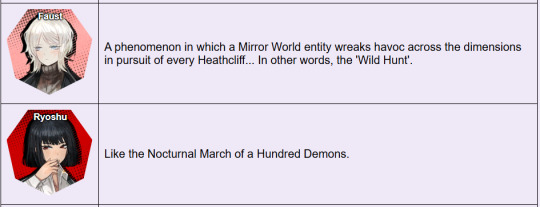
Now, additionally looking into what Wild Hunt, It was often considered a sign of an incoming catastrophe, especially to those that witness it, consisting generally of souls of the dead. An important part IMHO, is that there were variety of wild hunt leaders depending on story being told. Specifically Goethe's poem of Erlkoning, it is a harbringer of death. Simmilarily, Nocturnal March of a Hundred Demons, that being yokai (or spirits), is based on actual japanese folklore, with same trait of bringing death or misfortune to those who witness it. Thus, I theorise that a Wild Hunt is tied more with spirits of the dead, than Heathcliff himself. Now onto the second part of my thinking. The Rivers. We know, at the very least, of 2 explicitly stated Rivers that flow beneath the City, the river of human mind that we pull from in lobcorp, and Lethe, the river of oblivion. Additionally, in Divine Comedy - Inferno, we do in fact, pass through several Rivers of hell. And we know there is a river underneath Wurthering Heights. A "Hypogeal", aka subterrean one.
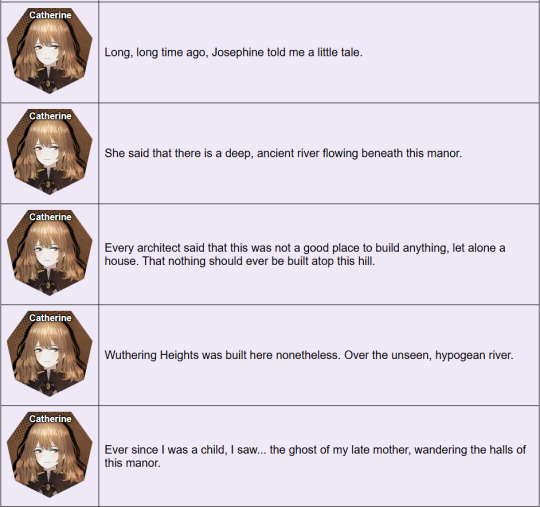
A river of bad vibes according to architects, and seemingly, a River tied to the Spirits of the Dead. Furthermore, Josephine directly implies that this River IS tied with bringing back the dead
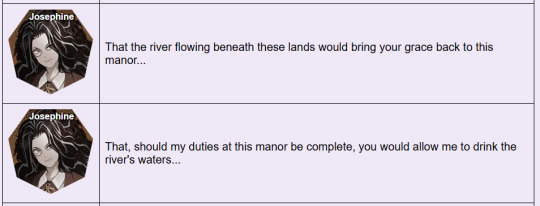
Hermann also, one of the characters that we'd expect to be the furthest from superstition, mentions how the river beneath Wurthering Heights stops the dead from passing on.
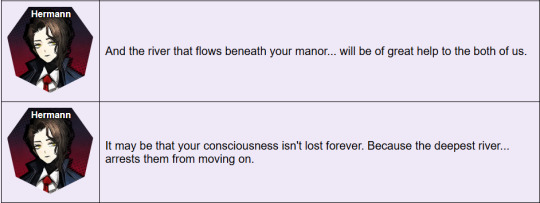
Now with that being repeadetly hammered into our heads, let's go for reasoning why I think it might be Acheron. In Dante's Inferno, by the shores of the Acheron lie the dead who cannot pass into the underworld, they are neither in Hell, nor outside of it, stuck in eternal pursuit of something. That's the first hit. The second, definetly sillier hit is - Dante was able to pass through Acheron ONLY because Vergilius forces the ferry of the dead to take them past it. While it would not be exact translation, since the ferry is Charon, one could think Vergilius stopping the Wild Hunt to let Dante and the Sinners to proceed could be a nod to that. Lastly, before trying to summarise my point's, I wish to mention that I DO believe that Heathcliff of Wild Hunt manifested an EGO, because when using that Identity, clashes during final bossfight of Canto 6 are done with his Skill 3 on Dullahan, while any other uses Heathcliffs base EGO. Thus, in the end. 1. I believe Wild Hunt is NOT exclusive to Heathcliff, BUT 2. All Heathcliffs have potential to reach into powers of necromancy through their exposure to the river of the dead in their past. 3. The Erlking specifically, is capable of summoning dead from other mirror worlds due to him commiting multiple mini-genocides of WH in different worlds. (This one I am less certain about.)
On topic of one of your reblongs The Wild Hunt/Necromancy ARE NOT extension of Heathcliffs EGO I believe. Sadly I do not have the most in depth argumentation at this moment because I am pulling all of this from my memory, but regardless.
1. - Through Canto 6 we get a few inklings that the line between life and death at Wurthering heights is blurred, most specifically through Josephine who seemingly is able to hear her already dead mistress. If I recall correctly, there's even a direct mention of an underground river flowing underneath WH, which leads me to
1,5. - We are shown several times that Rivers (Simmilar to stars), are places supernatural powers can originate from. River of Oblivion (Lethe), The river from which we pulled abnormalities. Thus, I believe that the river underneath is either Acheron (The river through which the dead are transported) or Cocytus (The river by which the dead wander, unable to go into proper afterlife.) Point is, I believe that the necromancy, and Wild Hunt are tied NOT to the individual of Heathcliff and his EGO, but to powers of the river which flows close to the surface of his home. That is NOT to say that the coffin or Dullahan themselves aren't EGO, rather, I think those two sources of supernatural reinforce each other. 2. There's also the fact that even at the end of Lobotomy Corporation we learned existance of Wild Hunt, and Faust presented it as a phenomenon rather than something applicable only to this. Before White Nights and Darkest Days, the only person who manifested EGO we know of was Kali, so that also implies to me that this phenomenon exists from different means than EGO.
You seem to be missing important bits of information that point towards necromancy being something Heathcliff himself might just have the potential of developing. Whether it's E.G.O or some other kind of ability we have yet to be introduced to is unclear, but it was made clear this is something tied to him.
Wild Hunt Heathcliff's Uptie Story has his narration state the following: "Though its origin is a mystery still, I came to learn how to command loyalty of the dead. Yet I had no teacher. I suppose my transformation was inevitable, as it was for my countless other selves in the infinite worlds."
This ability is reflected in gameplay through him being able to raise his allies from the dead. Because of this, we know that it's not something tied to the Manor, as he can use this ability on any stage of the game.
We also have a potential moment that might be hinting towards our Heathcliff developing similar abilities in Nocturnal Sweeping. He's able to get up and continue fighting despite being wounded in a way that should be fatal. He then comically falls dead once made aware of it. Knowing PM, the fact that it's framed as a joke means there might be foreshadowing hiding here.
Additionally you bring up Faust presenting The Wild Hunt as a phenomenon, but you miss the way she describes it. "They appear to be imperfect Identities, summoned from worlds chosen at random. It is the fate that awaits all those who become thralls to that Heathcliff. A phenomenon in which a Mirror World entity wreaks havoc across the dimensions in pursuit of every Heathcliff… In other words, the 'Wild Hunt'." She explicitly calls out that it's tied to Heathcliff.
66 notes
·
View notes
Text




sinclair log
339 notes
·
View notes
Text
Listen, I am HEAVILY thinking Sinclair, and overall the sinners of first 3 canto's will betray us either at the end of Inferno, or beggining of Purgatorio, and WILL grasp at anything I can use as possible foreshadow of that. This is also with his story in Demian in mind too.
Rereading all Sinclair Interactions since canto 4

IN YI SANGS FATHOMS SCRIPT HE WAS GIVEN ROLE OF TRAITOR/SELLOUT. IF THIS ISNT SINCLAIR BETRAYAL FORESHADOWING I WILL THROW UP MY HANDS.
17 notes
·
View notes
Text
Rereading all Sinclair Interactions since canto 4

IN YI SANGS FATHOMS SCRIPT HE WAS GIVEN ROLE OF TRAITOR/SELLOUT. IF THIS ISNT SINCLAIR BETRAYAL FORESHADOWING I WILL THROW UP MY HANDS.
17 notes
·
View notes
Text
Not a long or particularily coherent post, just felt like talking after period of extended writing block- Ryoshu and Sinclair will never get a shared ego or faction for ID's before Canto 9. The two of them clearly have some need for closeness with each other, feeling a pull, but at the same time there is repulsion, maybe even disgust betweeen the two of them, that prevents them from actually connecting. I think both of them, whether consiously or unconsiously refuse to connect, because part of what ties them is simmilar trauma, though with inverted roles, so any emotional intimacy would feel like a slight against those they have lost.
#limbus company#lcb analysis#limbus ryoshu#limbus sinclair#project moon#Im Dizzy So It Might Be Incoherent
13 notes
·
View notes
Text
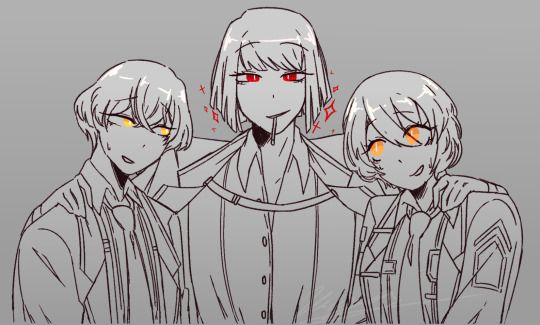
Ryōshū and her two short violent blondies with family issues.
402 notes
·
View notes
Text

woe lanterns be upon ye
280 notes
·
View notes
Text



the cutest girl perhaps ever! and definitely the normalest
based on transfer stations by airblue
140 notes
·
View notes
Text
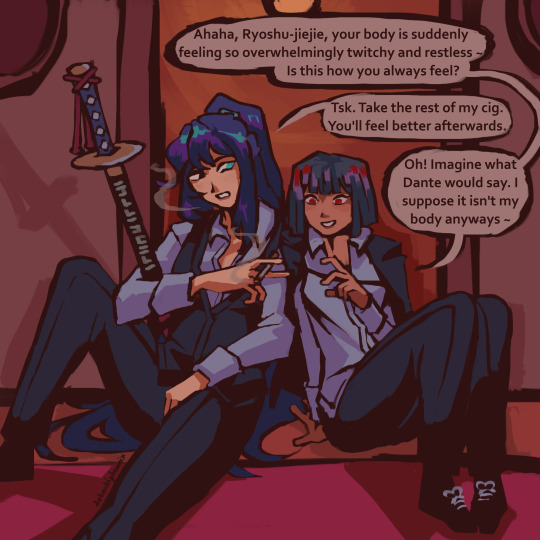
My skrunklies... I loved the April Fools event it was mind Blowing and I think about them a lot <3 featuring ryoshu's chronic cigarette addiction
1K notes
·
View notes
Text
Fic Bragging
Due to Middleclair being released, I felt deep need to make a celebratory fanfic about him Thus
https://archiveofourown.org/works/64230196
6 notes
·
View notes
Text


I know we finally get a fricking pair ego from the same abnormalities from RyoFau but my nerd ass only wanna talk about the detail nobody wanna paid attention (such as the damn diseases)
Wall of text warning below ⚠️
_____________________
First of all, in medicine, when referring to a patient as α or β, the meaning depends on the specific medical context.
Example: Thalassemia (Inherited Blood Disorder)
α-thalassemia patients: Lack or have mutations in the genes responsible for producing α-globin chains, affecting hemoglobin.
β-thalassemia patients: Lack or have mutations in the genes responsible for producing β-globin chains, leading to more severe anemia.
➡ β-thalassemia is generally more severe, often requiring regular blood transfusions, while α-thalassemia can range from mild symptoms to fetal hydrops (severe anemia in fetuses).
---
Or Streptococcus Infection (Related to Immunity & Bacterial Infections)
α-streptococcus patients: Infected with alpha-hemolytic streptococci, which commonly cause mild conditions such as pharyngitis (sore throat) or endocarditis (heart valve infection).
β-streptococcus patients: Infected with beta-hemolytic streptococci, especially Group B (S. agalactiae), which can lead to pneumonia or severe neonatal infections.
➡ Beta-hemolytic streptococcus is more dangerous, as it can cause sepsis (blood infection) and meningitis.
---
Neurological & Psychological Aspects
Patients with dominant alpha waves: Tend to be in a relaxed state, with lower stress levels.
Patients with dominant beta waves: Are more alert but may also experience heightened anxiety or stress.
➡ People with high beta wave activity are more prone to anxiety and sleep disorders, while those with high alpha wave activity may drift into a dreamy or drowsy state.
Regarding sleep deprivation, it's well known that if a person stays awake for 3–5 days, both the brain and muscles will begin to deteriorate, leading to extreme exhaustion and eventual loss of consciousness.
---
Back to the ego Thoracalgia α & β – Classification of Chest Pain I already explained from the Ryoshu post
Thoracalgia α: Neuropathic pain without nerve compression, often caused by central nervous system disorders, spinal cord damage, or inflammatory conditions.
Examples include: Postherpetic neuralgia (nerve pain following shingles) Spinal diseases without visible compression
Thoracalgia β: Pain due to compression or mechanical injury, commonly seen in conditions such as:
Herniated discs, Rib fractures or injuries, Costochondritis (inflammation of rib cartilage)
➡ Alpha (α) pain is chronic, influenced by the autonomic nervous system and alpha waves (8–12 Hz), causing dull, persistent discomfort.
Beta (β) pain is acute, associated with beta waves (12–30 Hz), and tends to be sharp and intense.


And base from their passive icon its seem to be two different type of inhaler
Faust is a dry powder inhaler (DPI) and Ryoshu is metered dose inhaler (MDI).
Basically (and sum up) their passive, Shallow exhale and Deep inhale links into that with how they experience the pain from thoracalgia

#limbus company#lcb analysis#limbus ryoshu#limbus faust#Holy Shit#More Context!#More Clues to Ryoshu just being physically fucked up!
186 notes
·
View notes
Text
There are two things about Outis's reaction to the "hierarchy" of sinners established in the LCB checkup that I want to talk about.
Beforehand, she is very eager to know where everyone stands (she is certain she'll be near the top)

And then she is. Don Quixote takes first easily, and Outis is second. Then it's Ryōshū, Meursault, Faust, Hong Lu, Rodion, Heathcliff, Ishmael, Sinclair, and then Yi Sang.
And it makes sense! She's a military veteran and a commander and probably has history with the Head, of course she'd be powerful. But... this is her reaction

which confused me for a long while. I assumed it was some kind of elaborate error- Ishmael is 3rd from the bottom, why would Outis be reacting as if she had been told Ishmael was more powerful than her?
But I wasn't looking at the context, that being Don Quixote

Outis realized that based on the idea that the strongest takes charge, Don Quixote would be the one leading them, and we've seen Outis displays a very, very deep mistrust of bloodfiends. Should Dante become "unavailable", Outis does NOT want Don leading them, and she suggests Ishmael rather than herself because she doesn't want to be a prominent target if/when Don is unleashed again. Don is volatile, and that makes Outis nervous.
The second thing is this

What an interesting reaction. Outis doesn't tend to let Dante's silent judgemental stares stop her from making suggestions.
Up until now, Outis often suggested the idea of sacrificing the weakest sinner, but then, it was always just a nebulous concept. There were probably plenty of sinners she thought of as the "weakest", mostly the loud and inefficient ones, but now she knows that sending the weakest sinner to go do unappealing tasks is a real thing they can order because they have declared the weakest sinner to be Yi Sang. To say she likes him and that's why she backpedaled might be a bit of a stretch, but if I ordered all the sinners by how much or little I think Outis respects them, Yi Sang is nowhere near the bottom of that list. He's a bleeding heart, but he's also a thinker, and that's something she values. Her hierarchy of sinners is different from Limbus Company's.
871 notes
·
View notes

